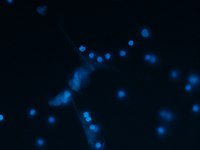
Photo from wikipedia
Acute respiratory distress syndrome (ARDS) is an acute inflammatory condition with a dramatic increase in incidence since the beginning of the coronavirus disease 19 (COVID‐19) pandemic. Neutrophils play a vital… Click to show full abstract
Acute respiratory distress syndrome (ARDS) is an acute inflammatory condition with a dramatic increase in incidence since the beginning of the coronavirus disease 19 (COVID‐19) pandemic. Neutrophils play a vital role in the immunopathology of severe acute respiratory syndrome coronavirus 2 (SARS‐CoV‐2) infection by triggering the formation of neutrophil extracellular traps (NETs), producing cytokines including interleukin‐8 (CXCL8), and mediating the recruitment of other immune cells to regulate processes such as acute and chronic inflammation, which can lead to ARDS. CXCL8 is involved in the recruitment, activation, and degranulation of neutrophils, and therefore contributes to inflammation amplification and severity of disease. Furthermore, activation of neutrophils also supports a prothrombotic phenotype, which may explain the development of immunothrombosis observed in COVID‐19 ARDS. This review aims to describe hyperinflammatory ARDS due to SARS‐CoV‐2 infection. In addition, we address the critical role of polymorphonuclear neutrophils, inflammatory cytokines, and the potential targeting of CXCL8 in treating the hyperinflammatory ARDS population.
Journal Title: European Journal of Immunology
Year Published: 2022
Link to full text (if available)
Share on Social Media: Sign Up to like & get
recommendations!